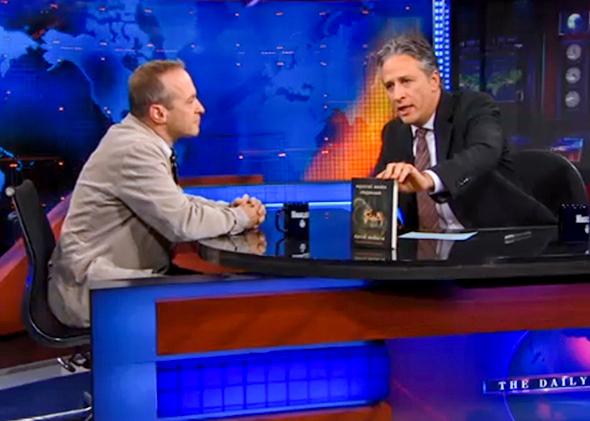Jon Stewart announced plans Tuesday night to leave his perch on The Daily Show later this year. The shrieks and cries you heard coming from Manhattan and Brooklyn? That was the sound of publishing and media insiders realizing that their best avenue for jump-starting book sales and making best-sellers is about to shut down.
After Oprah Winfrey ended her daily TV show in 2011, The Daily Show became it for book placement, the most desirable media platform on which an author could land. Ask industry insiders, and they’ll tell you almost every author asked about it, the same way they once begged for Oprah’s imprimatur. And unlike Oprah, who specialized in popular self-help, light spirituality, and easily accessible fiction, Stewart often took on serious societal and scientific nonfiction, issue books that all too frequently came with unhappy endings and no easy answers.
All the worse for authors and their handlers, Stewart’s announcement comes mere months after Stephen Colbert’s only slightly less influential The Colbert Report went off the air. “It’s devastating,” says Rimjhim Dey, the owner of Brooklyn-based Publisez PR, whose clients include advocacy groups and nonfiction authors. “To lose both Stewart and Colbert is a body blow to the publishing industry.”
Stewart’s sales impact was especially pronounced on books about politics, economics, and current events, the subjects he routinely skewered on his long-running comedy show. These are the sorts of tomes that didn’t get much love from Oprah and that get lost—when they are mentioned at all—on celebrity- and lifestyle-oriented morning programs like Today and Good Morning America. Promotional appearances on Charlie Rose and C-SPAN were valuable, but beyond that, authors often found themselves begging for appearances on low-rated MSNBC shows and the public-radio circuit. Comedy Central was a network that finally took them seriously while giving them the time to talk about their books to a general but engaged audience.
I would know. My book Pound Foolish: Exposing the Dark Side of the Personal Finance Industry got the nod in 2013. The book had been published almost two months earlier. The notices and placements had been respectable—positive reviews from the New York Times and the Economist, a C-SPAN After Words appearance—but like many books, it was fading fast. Then a Daily Show producer got in touch.
Blogger Greg Mitchell charted Pound Foolish going from No. 4,600 to No. 22 on Amazon in the days after I went on the show. I watched my book sales surge by several hundred percent on BookScan in the immediate weeks following the show’s airing. Producers for Frontline almost immediately asked me to be on a documentary they were filming on the retirement industry.
Other authors saw similar bumps. Ellen Schultz, who wrote Retirement Heist in 2011, about how corporations systemically underfunded their employees’ retirement pensions while turning them into profit centers for themselves, told me Wednesday morning that her book also soared on Amazon after she appeared on the program.
I don’t want to overestimate the intellectual bona fides of Stewart’s audience—in the weeks after my appearance, plenty of people emailed not to discuss, say, predatory financial-management firms but my height. (I’m what’s known as petite, and I’ve subsequently gathered it was a pretty rare event to see the notoriously not-so-tall Stewart tower over a guest.) But many, many others wrote to share their own stories about dealing with the personal finance and investment industries.
Over the years, publishing types have claimed that everyone from microfinance promoter Muhammad Yunus to Sierra Leone child soldier Ishmael Beah benefited enormously from appearances on The Daily Show. The autism memoir The Reason I Jump? It “skyrocketed,” as Bloomberg put it, after Stewart spoke up for it. “There’s never been a time when I’ve not seen a spike in book sales when an author appeared on The Daily Show,” says Kathleen Schmidt, the publicity director for Weinstein Books.
Colbert, while prominent, never had the same reliable impact. Yes, he could take on Amazon when the company was squabbling with publisher Hachette and turn Edan Lepucki’s novel California into a best-seller, but he could also turn on an author, or lead one to say utterly ridiculous things—just ask Caitlin Flanagan. Moreover, many of his interviews were as much about the character Colbert played as the book, even when he was a fan.
Stewart, as David Sedaris once put it, is “a delightful person and wants to make you feel comfortable.” Colbert, also a delightful person, might make an author feel comfortable or he might make an author feel like she was sitting on a set with a poisonous snake that could bite her. It made for entertaining television, but it didn’t always translate into book sales.
Now the publishing crowd is left wondering who’ll be able to regularly give serious nonfiction some commercial love. “We don’t know how Colbert will play out taking over for Letterman, and the format of John Oliver’s show isn’t conducive to guests just yet, and while he’s doing a great job, it’s too early to say what kind of impact his endorsement could possibly have on book sales,” Schmidt says. “With an election year on the horizon, and the inevitable avalanche of political books, losing Jon Stewart is a detriment.”
Stewart gave thoughtful books a thoughtful hearing, even when he disagreed with their premise or conclusions, and asked smart questions. He was funny and serious all at once, and gave writers the space to make their case. When he was enthusiastic, he said so. Not surprisingly, authors adore him. I’d go back on in a heartbeat. It’s too bad the window to do so is about to close.
Read more in Slate about Jon Stewart.
